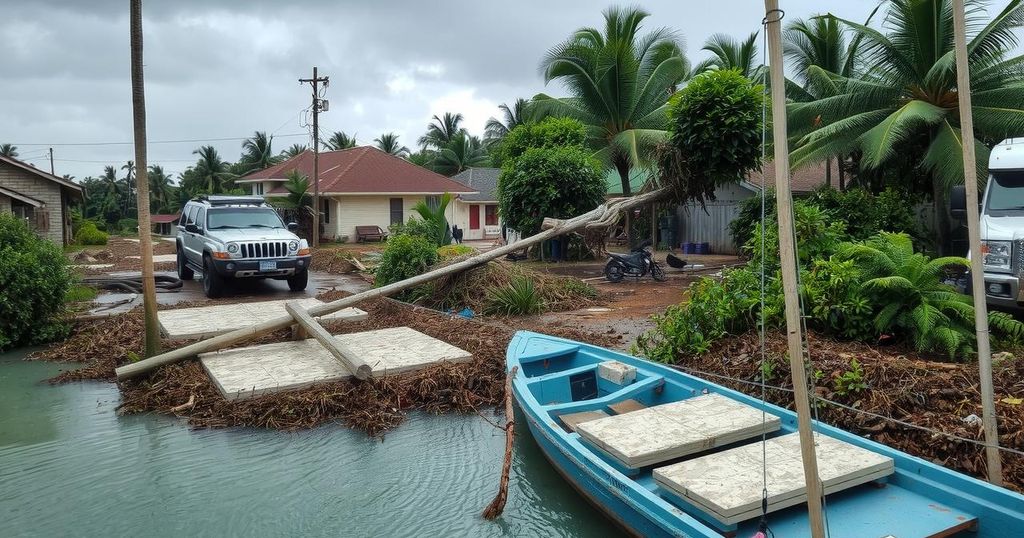Tropical Storm Dikeledi Intensifies Challenges in Mayotte Following Cyclone Chido
Tropical Storm Dikeledi is currently impacting Mayotte, compounding the challenges following Cyclone Chido. With heavy rainfall and strong winds, the storm threatens to disrupt recovery efforts while the region grapples with significant socio-economic vulnerabilities. Local officials have activated emergency protocols, urging communities to prepare and seek shelter. The necessity for international aid and a robust disaster management plan is evident as Mayotte confronts the growing threat of climate change.
The French territory of Mayotte is currently facing the devastating impact of Tropical Storm Dikeledi, which has prompted local authorities to issue a red alert. This situation comes as the island is still grappling with the aftermath of Cyclone Chido, a catastrophic storm that struck in December, resulting in significant loss of life and widespread injuries. Dikeledi’s heavy rains and strong winds threaten to exacerbate the challenges faced by the residents as they continue their recovery efforts.
Previously, Cyclone Chido was reportedly the worst storm to impact Mayotte in nearly a century, claiming at least 39 lives and injuring around 5,000 individuals. The infrastructure in Mayotte, often regarded as France’s poorest department, has suffered profoundly due to these extreme weather events, revealing significant vulnerabilities in disaster preparedness. The aftermath of Chido left the island struggling with power outages, extensive property damage, and the heartbreaking task of finding nearly 200 individuals still missing.
As the renewed storms wreak havoc upon the island, local governments have activated emergency protocols, directing citizens to gather essential supplies and seek refuge in secure shelters. Both local authorities and humanitarian organizations are engaged in concerted efforts to provide much-needed relief to affected residents.
International assistance is anticipated to be crucial in facilitating Mayotte’s recovery, yet logistical challenges related to communication and transportation complicate the delivery of aid to this geographically isolated region. These issues underscore the need for a robust, long-term disaster management strategy for Mayotte to better handle similar occurrences in the future.
Amidst ongoing climate change concerns, the recurrent storms impacting Mayotte emphasize the struggles of small island territories. The frequency and severity of such tropical storms in the Indian Ocean are aggravated by rising sea temperatures, raising alarms about the broader implications of climate change. Furthermore, the socio-economic difficulties faced by the population amplify the devastation inflicted by natural disasters, as higher unemployment and inadequate healthcare resources severely hinder recovery efforts.
Looking ahead, Mayotte faces a formidable challenge as it attempts to recover from two consecutive devastating storms. The need for adequate housing and support for those displaced by these disasters remains critical. Key priorities for recovery focus on addressing immediate needs while building long-term resilience to withstand future adversities. The international community is called to increase efforts in providing financial aid and technical support to such vulnerable regions, establishing a framework for future cooperation in climate resilience initiatives.
The experience of Mayotte illustrates the profound effects of climate change on fragile territories. With unified action from local leadership, global partners, and the Mayotte community, there lies hope for recovery and a sustainable future for the archipelago.
Mayotte, an Indian Ocean archipelago and a French department, has historically faced the brunt of tropical storms and natural disasters. Being one of France’s poorest regions, Mayotte’s infrastructure is particularly susceptible to damage from severe weather events. The challenges faced by the local population include not only the immediate impacts of disasters—such as loss of life and property—but also the long-term socio-economic struggles exacerbated by these occurrences, revealing a critical need for effective disaster management strategies to enhance resilience against climate change.
In summary, Mayotte is currently navigating the aftermath of Tropical Storm Dikeledi while still attempting to recover from Cyclone Chido. This situation emphasizes the urgent need for a stronger disaster preparedness strategy, enhanced international support, and resilience initiatives to mitigate the impact of climate change on vulnerable territories. The commitment of local authorities and global partners will be essential in reconstructing and reinforcing Mayotte’s future against similar adversities.
Original Source: www.travelandtourworld.com




Post Comment